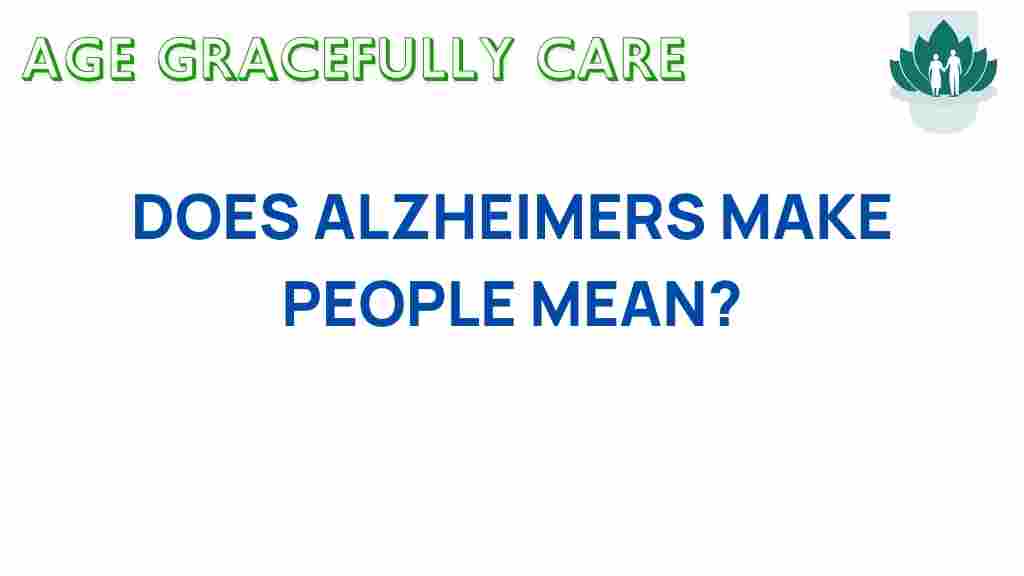Unraveling Alzheimer’s: Does It Make People Meaner?
Alzheimer’s disease is a complex and devastating condition that affects millions of individuals worldwide. As a form of dementia, it primarily impacts cognitive functions, leading to memory loss and confusion. However, one of the lesser-discussed aspects of Alzheimer’s is its profound effect on behavior and personality. Many caregivers and family members report significant changes in their loved ones, raising the question: Does Alzheimer’s make people meaner? In this article, we will explore the emotional impact of Alzheimer’s, the changes in behavior associated with dementia, and how caregivers can navigate these challenges while maintaining relationships.
The Emotional Impact of Alzheimer’s
The emotional toll of Alzheimer’s extends beyond the individual diagnosed; it also affects family members and caregivers. Understanding the emotional landscape of Alzheimer’s is crucial for addressing behavior changes effectively. Here are some common emotional responses observed in those with Alzheimer’s:
- Frustration: Many individuals with Alzheimer’s become frustrated due to their inability to remember names, events, or even how to perform daily tasks.
- Fear: As cognitive functions decline, individuals may feel lost, scared, or anxious about their surroundings and the changes they are experiencing.
- Depression: Loss of independence and cognitive ability can lead to feelings of sadness and hopelessness.
- Anger: When individuals struggle to communicate or understand their environment, they may express anger, which can sometimes be directed toward caregivers or family members.
These emotional responses can significantly influence behavior. It is essential to recognize that changes in behavior may not indicate a shift in personality but rather a reflection of the emotional distress caused by the disease.
Behavior Change in Alzheimer’s Patients
Behavior change is a hallmark of Alzheimer’s disease. As the brain deteriorates, individuals may exhibit various personality shifts and emotional responses that can be challenging for caregivers and families to manage. Here are some common behavior changes associated with Alzheimer’s:
- Increased Irritability: Individuals may become easily annoyed or upset, leading to outbursts or withdrawal.
- Loss of Empathy: Some may struggle to understand or respond to the feelings of others, leading to perceived insensitivity.
- Social Withdrawal: Affected individuals might isolate themselves, avoiding interactions that they once enjoyed.
- Repetition: They may ask the same questions repeatedly or tell the same stories, which can frustrate caregivers.
Understanding these behavior changes is critical for caregivers. They must remember that these shifts are not personal attacks but rather symptoms of the disease.
The Impact of Alzheimer’s on Relationships
Alzheimer’s can strain relationships, particularly between the patient and their caregivers. Changes in behavior can lead to misunderstandings and emotional distress for both parties. Here are some ways Alzheimer’s affects relationships:
- Shifting Dynamics: The relationship may shift from a partnership to a caregiver-patient dynamic, which can be challenging for both.
- Loss of Shared Interests: As interests change or decline, family members may find it difficult to connect with their loved one.
- Communication Barriers: As cognitive decline progresses, communication can become strained, leading to frustration and feelings of isolation.
Caregiving for someone with Alzheimer’s comes with unique challenges, especially concerning behavior changes. Here are some strategies for caregivers to navigate these shifts:
- Practice Patience: Understand that the behavior changes are a result of the disease and not a reflection of the individual’s true character.
- Focus on Empathy: Try to see the situation from the patient’s perspective to foster understanding and compassion.
- Establish Routine: Consistency can help reduce anxiety and confusion, making it easier for the individual to navigate their day.
- Engage in Activities: Find activities that the individual enjoys to help maintain engagement and emotional connection.
Step-by-Step Process for Managing Behavioral Changes
If you are a caregiver dealing with behavior changes in a loved one with Alzheimer’s, consider the following step-by-step approach:
- Observe and Document: Keep track of specific behaviors, triggers, and any patterns that emerge. This can help identify what may be causing certain reactions.
- Communicate Openly: Discuss observations and concerns with other family members or healthcare providers for support and guidance.
- Adjust Expectations: Be prepared for fluctuations in behavior and adjust your expectations accordingly. Flexibility is key.
- Utilize Support Groups: Engage with other caregivers through support groups to share experiences and coping strategies.
- Seek Professional Help: If behavior changes become overwhelming, consider consulting a mental health professional or a geriatric specialist.
Troubleshooting Tips for Caregivers
Coping with the behavior changes associated with Alzheimer’s can be overwhelming. Here are some troubleshooting tips:
- Stay Calm: In moments of frustration or anger, take a deep breath and remain calm. Your demeanor can influence the patient’s reactions.
- Redirect Attention: If a situation escalates, try to redirect the individual to a different activity or topic.
- Use Non-Verbal Cues: Sometimes, body language and facial expressions can communicate better than words.
- Be Aware of Environment: Adjust the surroundings to reduce noise and distractions, which can help minimize agitation.
- Practice Self-Care: Caregiving can be exhausting. Ensure you take time for yourself to recharge and maintain your mental health.
Conclusion: Understanding and Compassion in the Face of Alzheimer’s
The question of whether Alzheimer’s makes people meaner is complex. It is essential to recognize that behavior changes are often symptoms of the disease rather than true alterations in personality. By understanding the emotional impact of Alzheimer’s and the changes it brings, caregivers can approach these challenges with empathy and patience. Building strong relationships amidst the challenges of caregiving requires awareness, open communication, and a commitment to understanding the emotional landscape of this devastating disease.
For more information on Alzheimer’s and caregiving strategies, consider visiting Alzheimer’s Association. You can also explore support resources in your area to connect with others facing similar challenges.
Remember, navigating the waters of Alzheimer’s can be difficult, but with the right tools and understanding, caregivers can foster meaningful connections and preserve the dignity of their loved ones.
This article is in the category Health and created by AgeGracefullyCare Team
